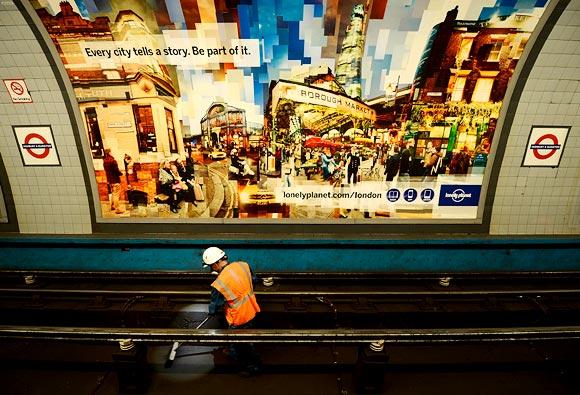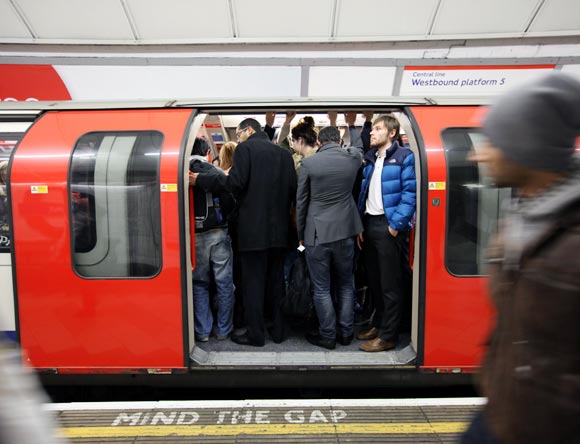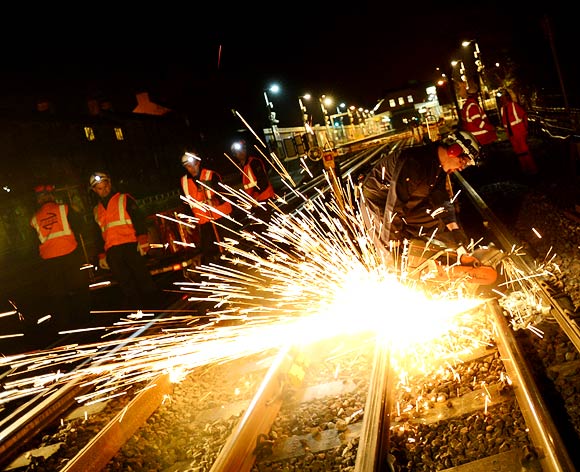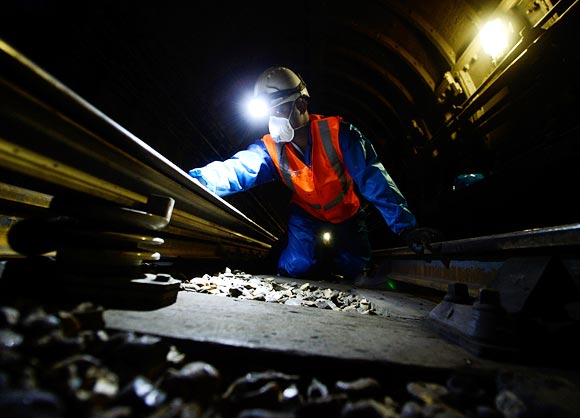Photographs: Dylan Martinez/Reuters
A light breeze moves through the cavernous tunnels of London's underground train network, a rarity for the workers whose heads are bent down while methodically sifting rocks and dust armed with just a brush and metal pick.
Among them is Michael Emordi, one of 10,000 night workers employed by London Underground to help ensure its subterranean railways are in top condition for the capital's four million commuters and prepare an already creaking system for the influx of half a million visitors for this summer's Olympic Games.
- Rudisha ready to slay another lion at Olympics
Emordi works as a "fluffer" manually removing hair, fibres and dust shed by passengers every day in the underground railway system, which if left to build has the potential to bring down the whole system.
It's a tough job but one of the many important roles that night workers perform in the dirt-caked tunnels beneath London's bustling surface to ensure the smooth running of the world's oldest underground transport system, which most Londoners simply refer to as "the tube".
'I can't guarantee a perfect service'
Photographs: Dan Kitwood/Getty Images
Transport for London (TfL), which is responsible for the majority of London's transport system, including the London Underground, expects to see an additional 500,000 passengers on the tube during the Olympics, a number that has seen many voice their concerns over whether the system can cope with the influx.
London Underground Chief Operating Officer Howard Collins said that is a challenge his organisation is prepared to take on.
But providing a perfect service during the Olympics may be difficult to achieve, said Collins, who hopes that the company's experience of dealing with delays will help ease congestion on a service which carries 1.1 billion passengers annually.
"I can't guarantee a perfect service, what I can guarantee is we have focused on all the issues in terms of reliability but more importantly if something goes wrong, the great thing about TfL's transport system, there are often alternatives routes."
'We've got equipment dating back from the 1920s'
Photographs: Dan Kitwood/Getty Images
TfL has also suggested commuters cycle or walk during the games and has launched a voucher scheme, offering passengers cheap theatre and cinema tickets to ease congestion on the tube during peak evening times, when spectators will also be leaving Olympic venues.
Many local businesses and government bureaucrats have already tested a work-from-home scheme earlier this year as a way to further ease the gridlock expected during the Games in July and August.
TfL will also suspend its normal maintenance during the Games, so staff can deal with immediate concerns.
Maintaining the Underground, which is nearly 150 years old, is extremely complicated, Collins said.
"It is a challenge in itself. It's a very diverse system. We've got equipment dating back from the 1920s, all the way to the most modern".
Working for the London Underground is a pleasure, said Emordi, who has been a fluffer for four years. But the job isn't as easy as many commuters would think, he adds.
"The worst thing about working on the underground is maybe the dust. We've got loads of dust down here, so if you inhale the dust without using the nose mask, it can cause long-term effects to your health".
Emordi, like many other Underground workers also known as "tunnel rats", travels to a different station every night, as part of TfL's biggest upgrade programme in its history.
The workers only have a few hours to carry out important works
Photographs: Dylan Martinez/Reuters
The public body is spending a billion pounds ($1.6 billion) a year to repair, maintain and modernise London's system, and all the work is done at night, the only time when work can be done on the track as the electric current which powers it is switched off.
The workers only have a few hours, a maximum of four and a half hours in many cases, to carry out important works before the first trains start to run, ferrying passengers who make up London's economic lifeblood across the capital once more.
Operations manager Darren Knowles is overseeing the replacement of a track and welding work further afield. The work has been delayed due to a new train being delivered and the workmen must wait until it is safe to start.
Knowing the difference he can make to people's journeys is one of the best things about the job, said Knowles, who joined the company 23 years ago as an apprentice.
"I make a difference by sending my teams and myself out, and just making improvements to the track. I get great satisfaction doing that."
It can be disappointing however, if something goes wrong, says Knowles. Causing a delay to the service or staff injuries are worst things that can happen on a job, he adds.
'They leave us alone and we leave them alone'
Photographs: Dylan Martinez/Reuters
As the morning approaches, workers quicken their pace to clear the track by call-back time when the currents for the trains are switched on. All work must be finished or halted for the first train to run.
Old posters stripped from the walls are gathered up, blue sacks of dust and newspapers stand heaped in a line ready to be removed, and the small brown mice who are the tube's permanent residents poke their tiny faces out for scraps to eat.
Emordi laughs and says there are probably thousands of mice running around. But Knowles has a tried and tested method for avoiding London's most populous pests on the Underground.
"They leave us alone and we leave them alone."







Comment
article